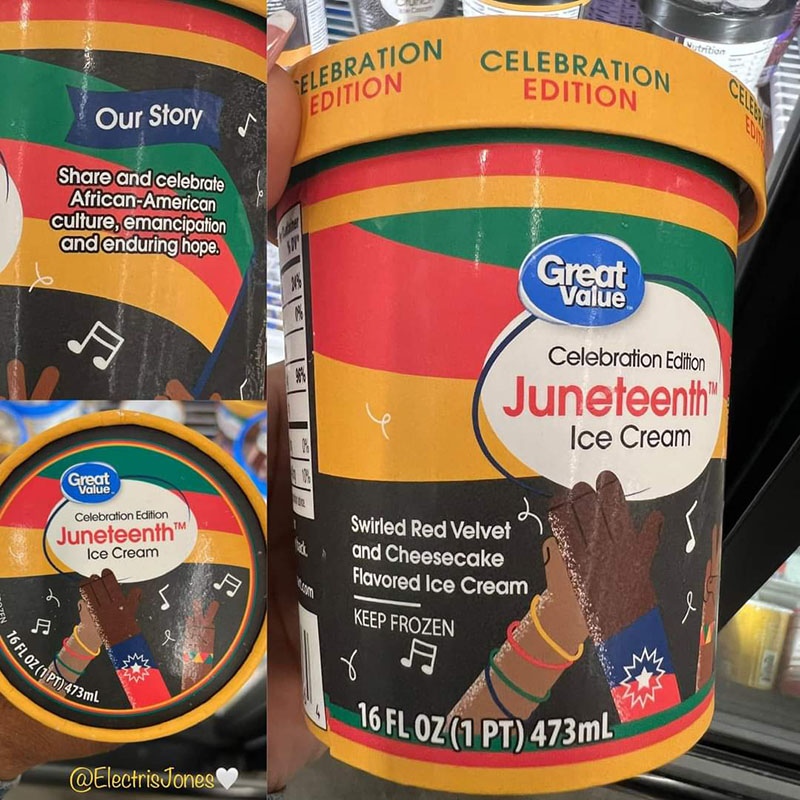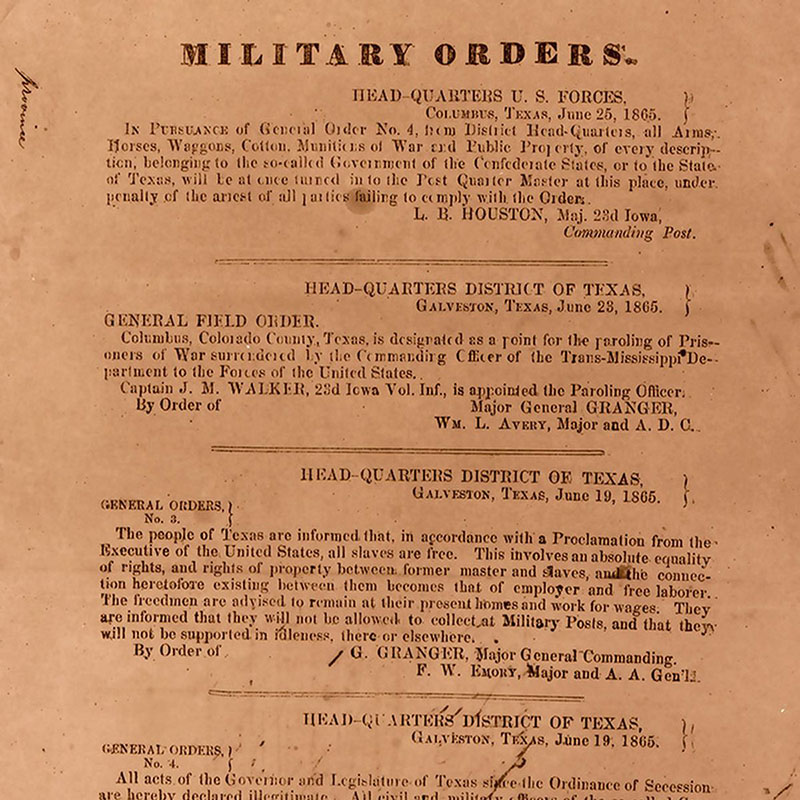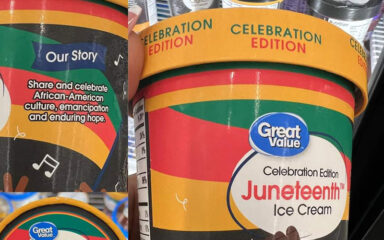
Question: Why did Walmart apologize and withdraw their celebratory Juneteenth ice cream?
Answer: Because yikes.
Walmart’s Celebration Edition Juneteenth Ice Cream promised to “share and celebrate African-American culture, emancipation and enduring hope” with red velvet cake-flavored liberation ice cream. More egregiously, a children’s museum in Indianapolis celebrated with the sale of a watermelon salad in their food court. The Dollar Tree sold “Celebrate Freedom” plates and napkins, ostensibly to add that extra Pan-African flavor to your family cookout.
Black leaders and community members were reasonably concerned, when President Biden made Juneteenth a federal holiday in 2021, that a very significant commemoration within their community was going to end up commercialized and stripped of meaning, and… boy howdy. But it doesn’t have to be that way. As with many other holidays with which a brand might be tempted to engage, it’s possible to celebrate Juneteenth without going full-on watermelon salad. Here’s some advice for what to do — and what to definitely not do.
And a note: The last thing the world needs is another white chick inserting her opinions where she has no worthwhile insight. All advice presented here comes from people who actually know stuff and are legitimately qualified to comment on the dos and don’ts of observing Juneteenth.
Before we get into that, though:
What Juneteenth is, actually
At its (over)simplest, Juneteenth celebrates the effective end of the institution of chattel slavery in the United States. Why all the qualifiers there? Because there’s a lot to it. The holiday, also known as Black Independence Day (among other names) commemorates the announcement of General Order No. 3, which proclaimed the end of slavery in the state of Texas, on June 19, 1865.
“Hold on,” might say the more historically knowledgeable among you, “the Emancipation Proclamation was issued on January 1, 1863.” Good catch. While the Proclamation did end slavery in secessionist states, enslaved people in Texas weren’t effectively emancipated for another two and a half years because… no one told them. It took that long for Union Major General Gordon Granger to make it out to Galveston to give them (and to actually enforce) the good news. (Another fun fact: Some enslavers replied with “Sorry, can’t hear you, I’m going through a tunnel” and delayed freeing their enslaved people until after harvest season. Because of course they did.)
And that’s why America’s Second Independence Day (as it’s also sometimes called) carries a lot more nuance than our standard, uncomplicated July 4th celebrations. It’s not about freedom for all. It’s more like if the U.S. declared independence from Britain, but no one bothered to tell Georgia, and so Georgia remained subjugated by the British for years until the news made it down to them, and also the Georgians had been owned and oppressed and generationally traumatized as literal property of the Redcoats for literally centuries — it’s a very specific celebration.
Juneteenth celebrations including readings, music, rodeos, and food go all the way back to 1866, making it the country’s longest-running Black-centered holiday. And while white people have never met a Black cultural moment they haven’t wanted to appropriate, that doesn’t make it okay.
What not to do

Regardless of other varying opinions, ten out of ten experts agree: No one needs Juneteenth ice cream.
Amara Enyia, a public policy expert for the Movement for Black Lives, calls the products “tone deaf” and “devoid of any real impact.” She says, “What people are demanding is not a new ice cream flavor or a new salad or any other symbolic gesture that really is just about generating profit from a commercialized holiday. What Black folks have demanded are structural and systemic changes to the systems in this country that have been harmful and oppressive.”
Similarly, Timothy Welbeck, an assistant professor of instruction in the Department of Africology and African American Studies and acting director of the Center for Anti-racism Research at Temple University, says, “I think on its face, the ice cream that Walmart attempted to sell at best feels performative and exploitative, in part because Juneteenth is a holiday that signals celebration of liberation, and this feels like an empty symbol rather than a meaningful gesture.”
And inclusive leadership consultant Lauren Tucker points out that performative gestures, decontextualized from the actual history, aren’t just pointless — they can be genuinely hurtful. “These are meaningful in terms of articulating both the pain and suffering [of Black Americans] but also the celebration of freedom,” she says. “And without contextualizing these foods, by the context, the history, you are just perpetuating more pain, more frustration and signifying that you don’t really understand or care about the history.”
What brands can do
How can brands acknowledge Juneteenth without making empty and/or full-on offensive gestures? Try just, like, not trying to make money off of them and focus on educating instead. Wendy Roundtree, founder and lead strategist at Jarel Communications, suggests that brands actually try to contribute to solving a problem instead of just dipping in with a celebratory statement and then dashing. “Ask the hard questions,” she says. “What problem are we addressing? Why are we taking a stand? And how can we influence positive change by our involvement? Marketing tactics are easy. Real impact requires a long-term investment in clear messaging about the problem and the solution.”
Stephanie Leonard, an assistant professor of management at Howard University, says that instead of trying to capitalize on the holiday, and instead of calling on Your Black Employee to outline an official Juneteenth observance to make the brand look like it cares, companies should do real research and appoint a Black-led committee focused on educating the public rather than pumping out the perfect Juneteenth-themed cash grab.
And per Ella Washington and Jasmine Sanders in the Harvard Business Review, “Much like Martin Luther King’s Day of Service, Juneteenth should be honored as a ‘day on, not a day off.’” Beyond just giving employees a day off in honor of the holiday, encourage ways to use that time, for instance, visiting Black cultural sites, learning more about the country’s history of systemic oppression, and (respectfully, where welcome) participating in local Juneteenth celebrations. “This anniversary is a tangible opportunity to amplify understanding of the unique experience of Black Americans and serve as a catalyst for conversations about intersectionality,” Washington and Sanders say.
Also, and I can never repeat this enough: If you’re not absolutely sure, there’s always the option of sitting it out. No one is holding your grandmother hostage until you post a tweet that isn’t purposeful, thoughtful, and relevant.
tl;dr: Education yes, exploitation no
Basically: You don’t have to not-acknowledge Juneteeth for fear of screwing it up. Just make sure you’re doing it in a purposeful, thoughtful, respectful way. Don’t try to turn it into a moneymaking opportunity or an oh-aren’t-we-inclusive brand development opportunity. And don’t think that what a 150-year-old holiday really needs is your innovative contribution to the observance. Honor the day, appreciate the history and the context, focus on education, and stay in your marketing lane.
And if all this talk of red velvet cheesecake ice cream has you wanting to add it to your standard dessert lineup, Right As Rain Red Velvet Cheesecake from Black-owned ice cream company Creamalicious can be purchased at Target year-round. I mean, it doesn’t celebrate emancipation or enduring hope, but… it also doesn’t celebrate emancipation or enduring hope. And it’s delicious.

